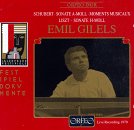| All Artists: Franz [Vienna] Schubert, Franz Liszt, Emil Gilels Title: Schubert: Sonate A-Moll; Moments Musicaux; Liszt: Sonate H-Moll Members Wishing: 0 Total Copies: 0 Label: Orfeo D'or Release Date: 12/12/1995 Genre: Classical Styles: Forms & Genres, Sonatas, Historical Periods, Romantic (c.1820-1910) Number of Discs: 1 SwapaCD Credits: 1 UPC: 750582868825 |
Search - Franz [Vienna] Schubert, Franz Liszt, Emil Gilels :: Schubert: Sonate A-Moll; Moments Musicaux; Liszt: Sonate H-Moll
 | Franz [Vienna] Schubert, Franz Liszt, Emil Gilels Schubert: Sonate A-Moll; Moments Musicaux; Liszt: Sonate H-Moll Genre: Classical
|
Larger Image |
CD Details |
CD ReviewsMislabelled, this is a STEREO recording! SwissDave | Switzerland | 10/26/2008 (4 out of 5 stars) "To get this out of the way first, this August 18, 1970 recital at the Mozarteum Salzburg was recorded in good stereo (virtually absent audience noise except for the applause at the end of each of the three performances). I'm saying this because of the "mono" mislabelling on the back and both side labels (it does say "stereo" on the CD itself). This should not be so important as it may seem, but I know from experience that it may keep some people from buying this. I tend to listen to lots of mono recordings whenever I'm not sitting in front of my stereo, or late at night on headphones, and the older I get, the less I seem to care about sound quality, but the more about interpretation and/or the quality of performance.
Someone told me to get this for Gilels's interpretation of Schubert's D.784, claiming it's got "even more Russian soul" (whatever that means) than Richter's. The latter's more idiosyncratic, that is unashamedly Richterian, live recording from 1979 in Tokyo, available on Olympia/Regis, remains my favourite of the piece, now followed by this one and Solomon (1952 EMI/Testament). Musically speaking, the simplicity (sometimes stillness) Gilels achieves appeals to me a great deal, although some false notes stick out like a sore thumb (I don't usually mind, it rather depends on when and where they occur). Gilels never skips from moments of local beauty to another, nor does the piece unfold incrementally in the manner Shukov plays it (now that interpretation - Munich 1992, available on Live Classics - sounds Russian to me!), instead it seems to unfold naturally so that he achieves a rare homogeneity (the piece has its critics, some have referred to D.784 as a "strange fish"), as if due to that seemingly impossible casualness of design that always seems to cut the Gordian knot in Schubert. Even so, this may still lack a little in Viennese flair for some (none of my favourite interpretations seem to exhibit much of it, and Solomon certainly doesn't ever sound casual, nor even as objectifying as one might expect). There is less of a to and fro between light and shadow here, as a whole, the piece comes across as less dark than in the other performances I've cited (but of course remains sombre music, as it should). Gilels's 1964/65 RCA studio recording is said to be tougher and more darkly hued, but I don't know it, so cannot compare. I have since found out that this D.784 is the favourite interpretation of quite a few Schubert lovers on German speaking (i.e. mainly Austrian, German and Swiss) discussion boards, so you never know, it may become yours, too. I love it, it sounds so "right" to me. If Richter is more captivating (to me he is), one is never quite sure if it's to Schubert's merit. Gilels seems to give the six Moments Musicaux D.780 almost greater weight or importance, and again, I like his way with these little gems. There are fewer finger slips here (more importantly, they don't hurt as much, same as in the Liszt Sonata that follows). I would still opt for Gilels's 1966 studio recording (a Melodiya/Ariola-Eurodisc LP with Schumann's Nachtstücke Op. 23 as a coupling), Schnabel or Curzon if I were forced to make a choice, but that doesn't detract from the value of this performance. The quietly yearning quality here, without ever pressing too hard, is adorable. Finally, this set contains a fine, poetic, at times powerful performance of the grand Liszt Sonata (it's of rather greater digital clarity than the Schubert performances that precede it - Gilels sounds fully warmed up here). This may well be the high point of the disc especially in the eyes (ears) of more devoted/loyal Gilels fans (who tend to prefer this and the 1961 Moscow live version on Melodiya to the 1964 RCA studio recording). Having said that, the list of great and/or legendary performances is almost endless (personal favourites include Horowitz 1932, Levy 1956, Demidenko 1992, Arrau 1970, Barere 1947, Anda 1954, Fiorentino 1997, Richter 1965, Fleisher 1959 etc.). To conclude with, I believe this disc is best appreciated taken for what it is, an unedited live recital (minus, I assume, encores, due to a total length of 78:44 minutes already as it is), and as such played through from beginning to end. Greetings from Switzerland, David." |

 Track Listings (12) - Disc #1
Track Listings (12) - Disc #1